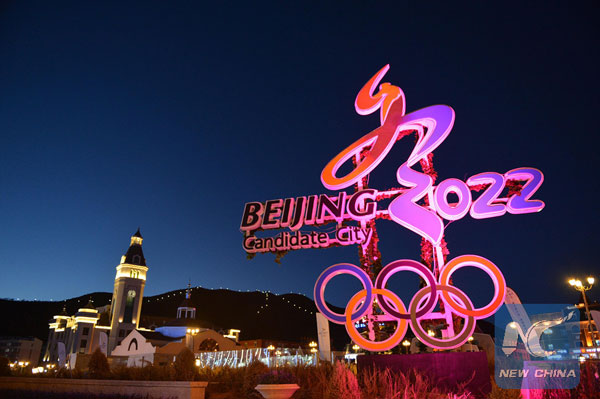Beijing sees improved air quality
 0 Comment(s)
0 Comment(s) Print
Print E-mail CRI, June 6, 2015
E-mail CRI, June 6, 2015
|
|
|
Street scenery of Beijing 2022 logo in Zhang Jiakou's Chongli County, a main snow comeptition zone in Beijing-Zhang Jiakou's co-host bid for the 2022 Winter Olympics. Picture is taken on March 21, 2015. [Photo: Xinhua] |
Authorities in Beijing have announced that the city has seen improved air quality this year.
Latest stats from the city's Environmental Protection Bureau show the number of days with high air quality reached 57 in the first four months of 2015, up eight days from a year earlier.
During the period, the number of days with severe air pollution decreased 42 percent year on year.
Meanwhile, the concentration of sulfur dioxide and fine particles less than 2.5 microns in diameter was reduced by about 43 percent and 19 percent, respectively.
The Chinese capital, along with its neighboring Tianjin Municipality and Hebei Province, has suffered from severe air pollution for years, with excessive coal use and car emissions among the key culprits.
Amid the country's stepped-up campaign against pollution, the three areas have decided to join hands.
Li Lixin heads the air pollution control division of the Beijing Municipal Environmental Protection Bureau.
He says the concerted effort has led to a big drop in pollution from coal-fired plants.
"The coal consumption in Beijing, Tianjin and Hebei has been cut by 19.8 million tons. Meanwhile, we have replaced 3.9 million tons of faulty coal with high-quality coal in the rural areas in those regions."
In its latest step, Beijing dismantled four remaining largest coal-burning boilers in the urban area in this past week.
According to the city's blueprint, the Dongcheng District in the downtown area will be coal-free in the future, while coal-burning boilers in other urban areas will be replaced with less-polluting ones.
Meanwhile, the city has also seen a decrease in car emission, another key contributor to pollution.
Li Kunsheng is also from the Beijing's Environmental Protection Bureau.
"Though car ownership in China has been increasing in recent years, vehicle emissions have actually decreased year on year."
As part of its anti-pollution move, Beijing has enacted strict restrictions on car use in the country.
Under a lottery-style quota system, its residents have to compete for limited license plate numbers before buying a vehicle, while cars have to be kept off road for one weekday per week, depending on the final digit of their license plate.
In the next step, the city may adopt a plan that will require residents to have first secured a parking space before purchasing a vehicle.
To reinforce the car-limiting effort, Beijing has also reached an agreement with Tianjin, Hebei, Shanxi, Shandong, Henan and Inner Mongolia to share car emission data and carry out cross-region law enforcement against drivers who breach emission limits but have their cars registered in other cities.
Beijing's authority has vowed to further step up its efforts to combat pollution in the wake of its bid for the 2022 Winter Olympics.
The city's urban center expects a 25 percent reduction in PM2.5 pollutants under a five-year plan that began two years ago.
By 2017, Beijing will have reduced the amount of coal burned in the city to 10 million tons from 23 million tons in 2013 and taken whole fleets of old, polluting vehicles off its roads.
The city's government has vowed to devote 48 billion yuan, or about 8 billion US dollars, to this effort.







Go to Forum >>0 Comment(s)